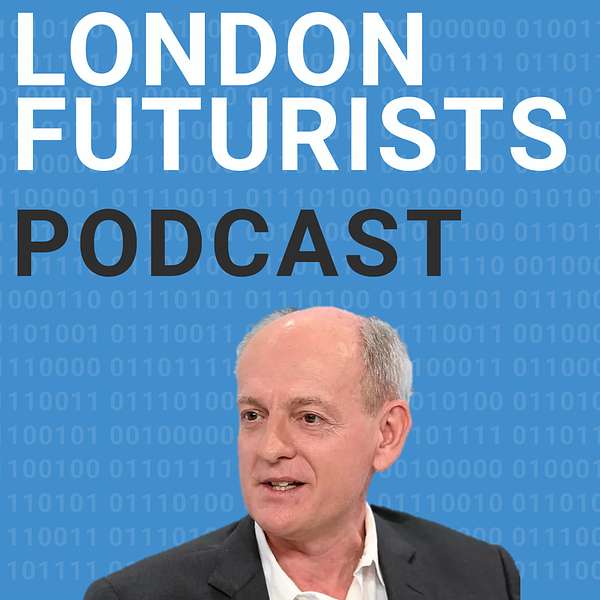
London Futurists
Anticipating and managing exponential impact - hosts David Wood and Calum Chace
Calum Chace is a sought-after keynote speaker and best-selling writer on artificial intelligence. He focuses on the medium- and long-term impact of AI on all of us, our societies and our economies. He advises companies and governments on AI policy.
His non-fiction books on AI are Surviving AI, about superintelligence, and The Economic Singularity, about the future of jobs. Both are now in their third editions.
He also wrote Pandora's Brain and Pandora’s Oracle, a pair of techno-thrillers about the first superintelligence. He is a regular contributor to magazines, newspapers, and radio.
In the last decade, Calum has given over 150 talks in 20 countries on six continents. Videos of his talks, and lots of other materials are available at https://calumchace.com/.
He is co-founder of a think tank focused on the future of jobs, called the Economic Singularity Foundation. The Foundation has published Stories from 2045, a collection of short stories written by its members.
Before becoming a full-time writer and speaker, Calum had a 30-year career in journalism and in business, as a marketer, a strategy consultant and a CEO. He studied philosophy, politics, and economics at Oxford University, which confirmed his suspicion that science fiction is actually philosophy in fancy dress.
David Wood is Chair of London Futurists, and is the author or lead editor of twelve books about the future, including The Singularity Principles, Vital Foresight, The Abolition of Aging, Smartphones and Beyond, and Sustainable Superabundance.
He is also principal of the independent futurist consultancy and publisher Delta Wisdom, executive director of the Longevity Escape Velocity (LEV) Foundation, Foresight Advisor at SingularityNET, and a board director at the IEET (Institute for Ethics and Emerging Technologies). He regularly gives keynote talks around the world on how to prepare for radical disruption. See https://deltawisdom.com/.
As a pioneer of the mobile computing and smartphone industry, he co-founded Symbian in 1998. By 2012, software written by his teams had been included as the operating system on 500 million smartphones.
From 2010 to 2013, he was Technology Planning Lead (CTO) of Accenture Mobility, where he also co-led Accenture’s Mobility Health business initiative.
Has an MA in Mathematics from Cambridge, where he also undertook doctoral research in the Philosophy of Science, and a DSc from the University of Westminster.
London Futurists
Don't try to make AI safe; instead, make safe AI, with Stuart Russell
We are honoured to have as our guest in this episode Professor Stuart Russell. Stuart is professor of computer science at the University of California, Berkeley, and the traditional way to introduce him is to say that he literally wrote the book on AI. Artificial Intelligence: A Modern Approach, which he co-wrote with Peter Norvig, was first published in 1995, and the fourth edition came out in 2020.
Stuart has been urging us all to take seriously the dramatic implications of advanced AI for longer than perhaps any other prominent AI researcher. He also proposes practical solutions, as in his 2019 book Human Compatible: Artificial Intelligence and the Problem of Control.
In 2021 Stuart gave the Reith Lectures, and was awarded an OBE. But the greatest of his many accolades was surely in 2014 when a character with a background remarkably like his was played in the movie Transcendence by Johnny Depp.
The conversation covers a wide range of questions about future scenarios involving AI, and reflects on changes in the public conversation following the FLI's letter calling for a moratorium on more powerful AI systems, and following the global AI Safety Summit held at Bletchley Park in the UK at the beginning of November.
Selected follow-ups:
Stuart Russell's page at Berkeley
Center for Human-Compatible Artificial Intelligence (CHAI)
The 2021 Reith Lectures: Living With Artificial Intelligence
The book Human Compatible: Artificial Intelligence and the Problem of Control
Music: Spike Protein, by Koi Discovery, available under CC0 1.0 Public Domain Declaration
Elevate how you lead with insight from today’s most influential executives.
Listen on: Apple Podcasts Spotify

